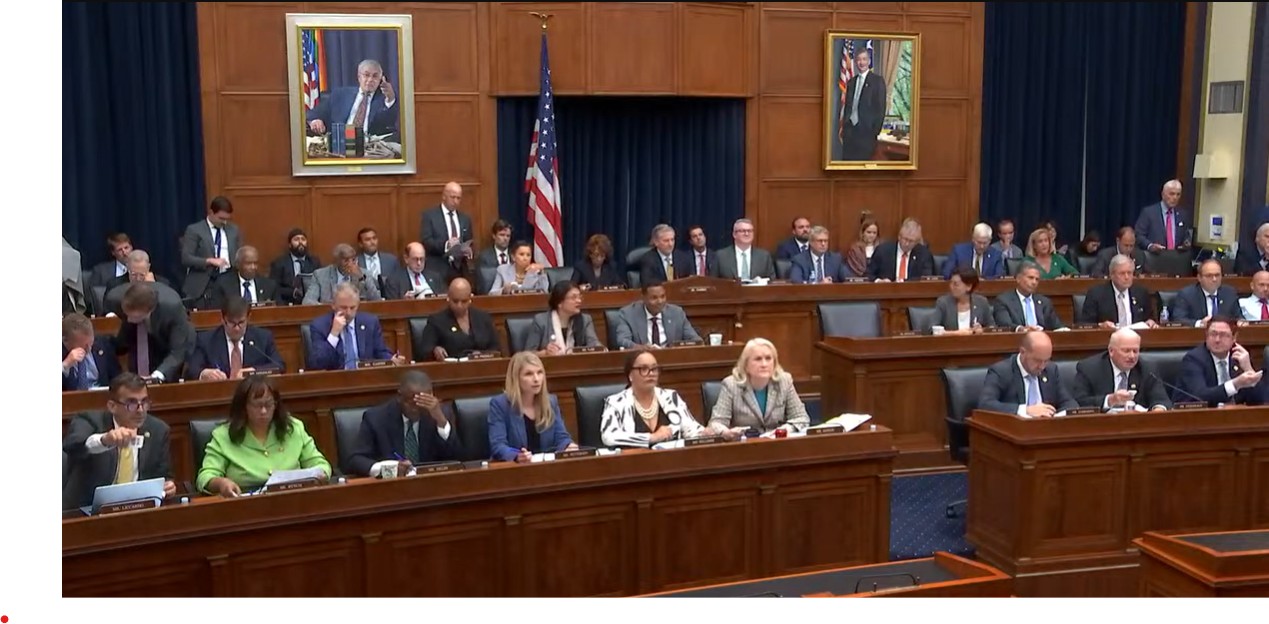Committee Passes Bipartisan Bills, Including Those Led by Democrats to Support Community Banks and Protect Americans Amid Sinking Economy
Committee Republicans Also Pass Dangerous Bills Giving Mega Corporations and Megabanks More Power

This week, the Committee successfully passed a slate of bipartisan bills, including those led by Committee Democrats.
✔ H.R. 5344, the “Kleptocracy Asset Recovery Rewards Program Act” led by Congressman Stephen Lynch (D-MA). This bill would establish a Treasury-based rewards program to incentivize identification and forfeiture of stolen assets that are linked to foreign government corruption.
✔ H.R. 3234, the “Keeping Deposits Local Act” led by Congresswoman Joyce Beatty (D-OH) and Congressman Tom Emmer (R-MN). This bill would modify limits first set by Congress in 2018 to increase the amount of reciprocal deposits exempted from brokered deposit restrictions, utilizing a tiered approach based on a bank’s total assets and total liabilities. Reciprocal deposits are part of a network operated by a third-party where a bank, for a fee, may provide insurance for a customer on funds greater than $250,000. Funds over the cap are distributed to other banks in the network, and those banks reciprocate and provide the originating bank matching funds so it may use the full amount of the deposit for lending or other purposes. A bipartisan amendment was adopted to narrow the scope to ensure community banks, including minority depository institutions (MDIs) and community development financial institutions (CDFIs), and mid-size banks benefit the most.
✔ H.R. 1531, the “PROTECT Taiwan Act” led by Congressman Vicente Gonzalez (D-TX) and Congressman Frank Lucas (R-OK). In the event of a Taiwan Relations Act Section 3(C) presidential notification of Congress, this bill would require Treasury, the Federal Reserve, and the SEC to seek China’s exclusion from the proceedings of the G20, the Bank for International Settlements, the Financial Stability Board, the Basel Committee on Banking Supervision, the International Association of Insurance Supervisors, and the International Organization of Securities Commissions.
✔ H.R. 2478, the “Financial Exploitation Prevention Act” led by Congressman Josh Gottheimer (D-NJ) and Congresswoman Ann Wagner (R-MO). The bill allows for the delay of the redemption of mutual funds, if the sponsor of the fund reasonably believes the redemption involves the financial exploitation of an individual age 65 or older or an individual age 18 or older who is unable to protect his or her own interests. Additionally, the SEC must make legislative and regulatory recommendations to address the financial exploitation of these adults. This bill passed on suspension, with the Ranking Member’s support, in the 118th Congress.
✔ H.R. 3682, the “Financial Stability Oversight Council Improvement Act” led by Congressman Bill Foster (D-IL). This bill modifies the Financial Stability Oversight Council’s process to designate a nonbank financial company as a systemically important financial institution.
✔ H.R. 5317, the “Community Bank Deposit Access Act” led by Congressman French Hill (R-AR). Custodial deposits allow smaller banks to ensure a customer with more than $250,000 in deposits can obtain FDIC insurance for the full amount of their deposit, spreading the funds across other banks in a custodial deposit network. A bipartisan amendment was agreed to that narrowed the bill to ensure it focuses on community banks, including MDI and CDFI banks, with less than $10 billion.
Unfortunately, Committee Republicans also jammed through a slate of bills that will add to the pain American families are already experiencing under the failed leadership and economic policies of Donald Trump. Including bills that aim to:
X Transform the country into a nation of “Too Big to Fail” banks – while leaving community banks in the dust. Specifically, a bill offered by Congressman Fitzgerald that would completely waive a review for bank mergers, regardless of whether the bank would become the only lender in a community. This bill will accelerate consolidation and lead to fewer community banks.
- Republicans voted no on an amendment offered by Ranking Member Waters to reverse the growing trend of rubber stamping bank mergers. The amendment requires mergers resulting in a bank with more than $100 billion in assets to: 1) have at least one public hearing; 2) have a community benefits plan; and 3) minimize banking deserts related to any branch closures.
X Weaken oversight of the biggest, worst-acting big banks. Specifically, a bill offered by Congressman Huizenga that would undermine stress testing of the largest banks, a key reform following the 2008 financial crisis that strengthened the safety and soundness of the banking system. This would undoubtedly pave the way for a financial crisis.
- Despite the growing risk climate change poses to the banking system, Republicans voted no on an amendment offered by Congressman Casten that would strike the bill’s provisions prohibiting the Federal Reserve from conducting climate-related stress tests.
- Republicans voted no on an amendment offered by Ranking Member Waters that would promote the independence of the Federal Reserve by stipulating that the bill will take effect January 2029, but will not take effect if a federal court finds, before that time, that the President attempted to unlawfully fire a Fed Governor.
X Repeal the authority of the SEC to protect investors. Specifically, a bill offered by Congressman Barr that would repeal key investor protections of the Dodd-Frank Act. Including one to hold broker-dealers to the same fiduciary standard as investment advisers to make sure they act in their clients’ best interest. And another to rescind the SEC’s authority to prohibit forced arbitration clauses that prevent clients of broker-dealers or investment advisers from suing their brokers or advisers in courts. By forcing the SEC to abandon critical regulatory tools as securities markets become increasingly complex and dynamic, the legislation essentially handcuffs the primary agency responsible for protecting American investors and maintaining market integrity.
###


